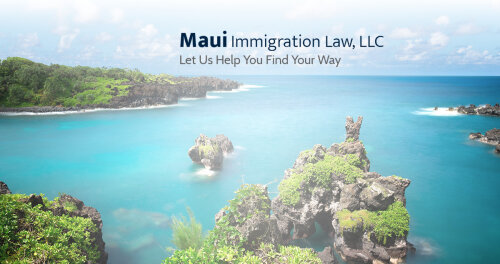Best Business Visa Lawyers in Hawaii
Share your needs with us, get contacted by law firms.
Free. Takes 2 min.
Or refine your search by selecting a city:
List of the best lawyers in Hawaii, United States
About Business Visa Law in Hawaii, United States
A business visa is a non-immigrant visa that allows foreign nationals to enter the United States temporarily for business purposes. In Hawaii, as in the rest of the United States, business visas are governed by federal immigration laws, with local agencies and attorneys providing guidance to navigate specific state-related considerations. The most common business visas include the B-1 Visitor for Business Visa, E-1 Treaty Trader Visa, E-2 Treaty Investor Visa, L-1 Intracompany Transferee Visa, and H-1B Specialty Occupation Visa. Each visa type serves different business objectives, from attending meetings and negotiating contracts to investing in or establishing businesses in Hawaii.
Why You May Need a Lawyer
Applying for a business visa can be complex, especially when your business plans involve Hawaii's unique economic and legal landscape. Here are some common situations where you may need legal assistance:
- You are unsure which visa category best fits your business activities.
- Your visa application has been denied or you have received a request for additional information (RFE).
- You are seeking to invest in or start a new business entity in Hawaii.
- Your employment involves transferring internationally to a branch, parent, affiliate, or subsidiary in Hawaii.
- Your business involves sensitive areas, such as technology or natural resources, subject to specific regulatory scrutiny or restrictions.
- You need to ensure compliance with both federal immigration laws and Hawaii state business regulations.
- You anticipate that your stay may need to be extended or changed to another visa category.
Local Laws Overview
While business visa requirements are set federally, there are local laws and considerations in Hawaii that can impact foreign entrepreneurs and business professionals. For example, Hawaii has its own regulations regarding business entity formation, labor laws, and zoning, which can be important for investors and entrepreneurs. Additionally, Hawaii's strategic location in the Pacific, focus on tourism, and environmental protections mean that certain business activities may be subject to special local scrutiny or additional permitting processes. Lawyers familiar with both federal immigration procedures and Hawaii's state regulations can ensure your business activities are fully compliant and your visa application is accurately prepared.
Frequently Asked Questions
What types of business visas are available for Hawaii?
The most common types include the B-1 Visitor Visa, E-1 Treaty Trader Visa, E-2 Treaty Investor Visa, L-1 Intracompany Transferee Visa, and H-1B Specialty Occupation Visa. Each serves different purposes, from temporary business activity to investment and employment.
Can I start a new business in Hawaii on a business visa?
Typically, visas like the E-2 Treaty Investor are appropriate for starting or investing in a new business. The B-1 visa does not allow active participation in running the business, only preliminary activities such as meetings or negotiations.
How long can I stay in Hawaii on a business visa?
B-1 visas usually allow stays of up to 6 months, though extensions are possible in certain cases. Other visas such as L-1 or E-2 can allow multiple years of stay, depending on the circumstances.
What documents are needed for a business visa application?
Requirements vary by visa type but generally include a valid passport, proof of business purpose, supporting financial and corporate documents, and evidence of intent to return to your home country.
Can family members accompany me on my business visa?
Yes, certain business visas allow spouses and children to obtain derivative visas to accompany you, such as the L-2 for L-1 holders or E-2 dependent visas.
Do I need to invest a minimum amount for an E-2 visa in Hawaii?
While there is no legally specified minimum, investments typically need to be substantial relative to the business. Amounts often range from 100,000 dollars upward, depending on the business type.
Are there special considerations for businesses in tourism or hospitality?
Yes, given Hawaii's focus on tourism, extra state and local regulations may apply, including licensing and environmental rules. A lawyer can help you ensure compliance.
What happens if my business visa application is denied?
You may appeal or reapply, preferably with legal assistance to address the reasons for the denial, provide additional documentation, or clarify your business purpose.
Can I change my business visa type while in Hawaii?
In certain situations, you may apply to change your status to another visa category while in the United States, such as from a B-1 to an E-2. Consult a lawyer to ensure this is done lawfully.
Who handles business visa applications in Hawaii?
Business visa applications are processed by US Citizenship and Immigration Services (USCIS), and consular posts abroad. local attorneys and agencies provide guidance and support during the process.
Additional Resources
Several agencies and organizations can assist with business visa questions in Hawaii:
- US Citizenship and Immigration Services (USCIS)
- Hawaii State Department of Commerce and Consumer Affairs (DCCA)
- Hawaii Chamber of Commerce
- Hawaii Small Business Development Center (SBDC)
- American Immigration Lawyers Association (AILA) Hawaii Chapter
- Consulates and embassies in your home country
Next Steps
If you are considering applying for a business visa related to Hawaii, start by clearly defining your business objectives and visa type. Gather all relevant documentation and seek the assistance of an immigration attorney, preferably one with experience in both federal immigration process and Hawaiian state business law. An attorney can assess your situation, guide you through the application steps, help with document preparation, and represent you in case of challenges. Many law firms offer initial consultations, so do not hesitate to schedule a meeting to discuss your visa options and increase your chances of success.
Lawzana helps you find the best lawyers and law firms in Hawaii through a curated and pre-screened list of qualified legal professionals. Our platform offers rankings and detailed profiles of attorneys and law firms, allowing you to compare based on practice areas, including Business Visa, experience, and client feedback.
Each profile includes a description of the firm's areas of practice, client reviews, team members and partners, year of establishment, spoken languages, office locations, contact information, social media presence, and any published articles or resources. Most firms on our platform speak English and are experienced in both local and international legal matters.
Get a quote from top-rated law firms in Hawaii, United States — quickly, securely, and without unnecessary hassle.
Disclaimer:
The information provided on this page is for general informational purposes only and does not constitute legal advice. While we strive to ensure the accuracy and relevance of the content, legal information may change over time, and interpretations of the law can vary. You should always consult with a qualified legal professional for advice specific to your situation.
We disclaim all liability for actions taken or not taken based on the content of this page. If you believe any information is incorrect or outdated, please contact us, and we will review and update it where appropriate.
Browse business visa law firms by city in Hawaii
Refine your search by selecting a city.









